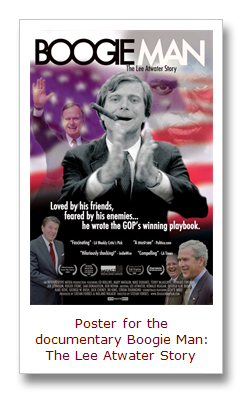In November of 1989, the first year of George H. W. Bush’s presidency, there were two closely watched gubernatorial elections — one in Virginia, the other in New Jersey.
The Democratic candidates won both races. And, in both campaigns, the candidates’ positions on abortion played a role.
The winning Democrats, Douglas Wilder in Virginia and James Florio in New Jersey, were pro-choice. Their Republican opponents, J. Marshall Coleman and Jim Courter, were anti-abortion.
This led to speculation that the Republican Party’s hardline position against abortion would be a problem in the 1990 mid-term election, allowing the Democrats to gain seats in the U.S. Senate and House of Representatives.
On November 14, 1989, reporters asked the Chairman of the Republican National Committee, Lee Atwater, what he thought.
Atwater had helped design the winning presidential campaigns of Ronald Reagan and George H. W. Bush. He was a master and pioneer of the use of political “wedge issues” like abortion and crime.
It was Atwater who created the notorious “Willie Horton ad” that played a key role in Bush’s victory over Democrat Michael Dukakis in 1988, by making Dukakis seem soft on criminals.
When asked what the November 1989 gubernatorial election meant for Republicans, Atwater gave a much-quoted answer that helped popularize the political term “a big tent.”
“Our party is a big tent,” Atwater told reporters that day. “We can house many views on many issues. Abortion is no exception.”
Some language reference books say that Atwater coined the phrase “a big tent” that day.
But, although his use is the most famous and gave the term wide familiarity, it had been used previously in politics by both Republicans and Democrats.
In 1975, for example, Democratic House Speaker Thomas “Tip” O’Neill told a reporter: “The Democratic Party is a big tent. We are widely diversified.”
During the 1980 presidential election, the Republican National Chairman at the time, Bill Brock, urged the party to embrace a “big tent” strategy. That year, Ronald Reagan won in a landslide over President Jimmy Carter and Republicans gained control of the Senate — the first time Republicans controlled one of the Houses of Congress since 1954.
Lee Atwater died from a brain tumor less than two years after making his own, more famous “big tent” remark.
Before he died, he said he regretted the divisive wedge issue style of politics he helped create. In a widely-noted article published in the February 1991 issue Life magazine, Atwater wrote:
“My illness helped me to see that what was missing in society is what was missing in me: a little heart, a lot of brotherhood.”
After writing those revelatory words, Atwater passed away on March 29, 1991 at the age of 40.
If he were still alive, it would be interesting to hear what he’d say about the current state of political “discourse.”
For further reading and viewing, I highly recommend the book Bad Boy: The Life And Politics Of Lee Atwater by John Brady and the documentary Boogie Man: The Lee Atwater Story
.
* * * * * * * * * * * * * * * *
Comments? Corrections? Post them on the Famous Quotations Facebook group.


